Developing story
How MSF is responding to the war in Gaza
What to know about the humanitarian catastrophe in Gaza and how we're addressing the dire needs.
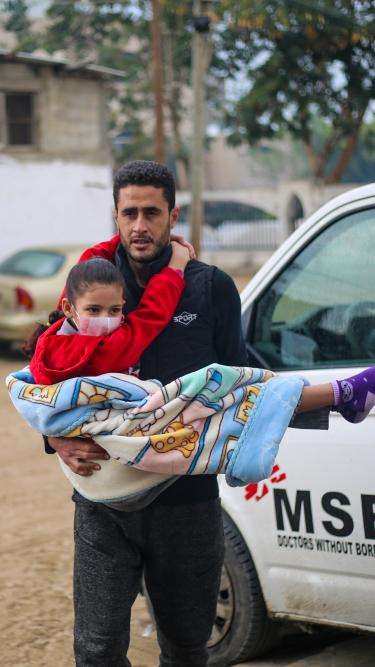
Developing story
What to know about the humanitarian catastrophe in Gaza and how we're addressing the dire needs.
May 1, 2024—Before the current war, an estimated 500 truckloads of supplies entered Gaza every day; by February 2024, this reportedly dropped to under 100. "There is no clarity or consistency to what is allowed into Gaza," writes Mari Carmen Viñoles, head of Doctors Without Borders/Médecins Sans Frontières (MSF) emergency programs. "Sometimes an entire shipment is rejected because of one item, but the reasons are not communicated to us, making it impossible to adapt future shipments accordingly."
Nearly seven months into the devastating war in Gaza, Israeli forces’ unrelenting, indiscriminate strikes have reduced much of the Strip to rubble.
To date, more than 34,000 Palestinians have been killed and over 77,000 wounded, and thousands are estimated to be buried under the wreckage. Over 1.9 million people—85 percent of the entire population—have been forcibly displaced, and the majority are crammed into the southern city of Rafah, which faces an imminent invasion by Israeli forces. Water and food are scarce, essential supplies like fuel and electricity are scant, and while the threat of disease and starvation grows and the bombardment continues, lifesaving health care is increasingly inaccessible. Doctors Without Borders/Médecins Sans Frontières (MSF) teams in Gaza have witnessed firsthand how this war has turned a chronic humanitarian crisis into a catastrophe.
Photo above: Palestine 2023 © MSF
The ceasefire resolution passed by the UN Security Council on March 25 was not implemented, which renders it little more than political theater. Israeli forces continue to carry out widespread attacks that disproportionately impact civilians, and have confirmed an imminent invasion of Rafah that would be catastrophic for over one million people who are trapped there after being forced from their homes elsewhere in the Strip. Palestinians in Gaza are suffering every day from an all-out destructive military campaign that blatantly ignores the rules of war.
The duty of treating the sick and wounded—and the correlating protection of medical personnel and facilities—is at the core of international humanitarian law. Yet, since the beginning of this war, MSF has seen a pattern of systematic attacks against medical facilities and civilian infrastructure. The health system in Gaza is being dismantled while the immense needs grow more dire each day. Attacks against hospitals and civilians must stop now.
The Israeli government's policy of deliberate deprivation—only allowing a trickle of food and water to enter Gaza—has led to widespread, deadly starvation and an imminent famine. At the same time, access restrictions by Israeli authorities prevent us from providing essential aid at scale. We cannot afford to wait for the emergency to get worse before taking action. Israeli authorities must lift the inhumane and unlawful siege and allow more medical supplies to enter Gaza, including anesthesia, so health workers can provide a basic standard of care.
Airdrops and sea routes are no alternative to aid delivery by land. In MSF’s experience, airdrops are notoriously ineffective and can increase the risks for people who need the aid, especially in situations of war and chaos. Efforts to open a maritime corridor merely create an illusion of support for the needs of Palestinians. These methods are not any kind of solution to the extraordinary humanitarian crisis in Gaza. The food, water, and medical supplies so desperately needed are sitting just across the border. Israel needs to facilitate rather than block the ground flow of supplies.
On January 26, the International Court of Justice (ICJ) issued provisional measures for Israel to take to prevent a plausible genocide in Gaza, including allowing humanitarian aid into the Strip. Yet we are witnessing a worsening situation in Gaza and indiscriminate attacks on civilians, medical and aid workers, and health facilities continue. All states that support these actions by Israel are morally and politically complicit. We call all on governments, particularly the US, UK, and allied EU member states, to do whatever in their power to influence Israel and stop supporting the ongoing siege and bloodshed.
Israel must resume issuing medical referral permits for treatment in the West Bank and Jerusalem for severe cases that cannot be treated in Gaza. All medical referrals, patients, and their caregivers must be guaranteed safe, voluntary, and dignified return to Gaza.
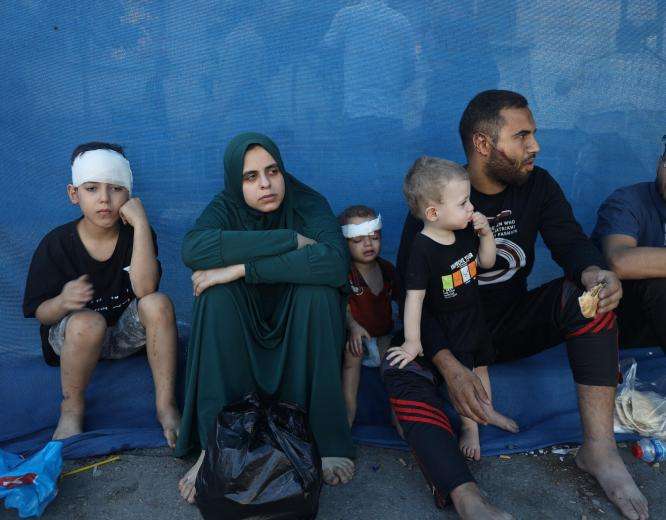
Members of MSF's team in Gaza share their experiences living and working under bombardment and siege.
MSF staff have been working in Gaza’s hospitals and clinics throughout the current conflict. Our teams provide a range of essential medical services including:
Many of the hospitals MSF supports throughout Gaza have been hit or subjected to evacuation orders that put the lives of patients and staff at risk—so our teams are continually adapting to extremely volatile conditions on the ground. Today, MSF mainly operates in southern and central Gaza, including in Rafah, Khan Younis, and Deir Al-Balah.
MSF has delivered about 200 tons of medical supplies each month, including medicines, surgical kits, logistical items, and humanitarian aid. As of mid-March 2024, we have brought in 53 trucks carrying essential supplies. However, it has been extremely difficult to get supplies into Gaza due to administrative barriers, movement restrictions, and the lack of options for crossings. Our teams in Egypt are ready to send more medical supplies into Gaza if allowed to do so safely.
Drinkable water is scarce in Gaza, so water distribution is an important part of MSF’s response. We provide about 300 cubic meters of clean water per day throughout Rafah and are trying to increase this quantity. On March 28, MSF set up a new desalination plant in Al-Mawasi.
The medical needs in Gaza are immense. Many Palestinians need urgent assistance—including people trapped under rubble, pregnant women who are about to deliver, and the elderly—and are not able to access care when they need it most. The core needs MSF is seeing and seeking to address include:
Since October 7, increasing settler violence against Palestinians and movement restrictions have exacerbated the health impacts of life under occupation, particularly on mental health and access to care.
MSF has responded by expanding efforts to reach communities unable to access care, bolstering local emergency response, and addressing the needs of Gazans who have been stranded in the West Bank after losing their work permits in Israel after October 7. Our activities include:
MSF does not currently run medical programs in Israel but offered its support to Israeli hospitals treating large numbers of casualties following the Hamas attacks on October 7. We focus on filling the greatest gaps in health care, and Israel has strong emergency and health systems.
MSF provides medical care to anyone who needs it, regardless of race, religion, or political affiliation. As an organization, we focus on filling the greatest gaps in health care.
To facilitate our humanitarian and medical work, we speak to all parties to the conflict to request safe, rapid, and unimpeded access to civilians who require medical care and to ensure the safety and security of our staff. Our independence and impartiality are essential to our work in all the places we operate across the globe. We also believe that the principles of impartiality and neutrality are not synonymous with silence. When the world turns its back on crises, we are duty-bound to raise our voices and speak out on behalf of our patients. Our decision to do so is always guided by our mission to do no harm, preserve respect and dignity, and protect life and health.
Despite the protections afforded to health workers and facilities under international humanitarian law, MSF teams in Gaza have witnessed a pattern of attacks on health care in Gaza, with medical staff being killed, arrested, and mistreated on a regular basis, along with the destruction of major hospitals such as Al-Shifa and Nasser hospitals.These attacks have left less than a third of the main hospitals in Gaza functional—with severe limitations on the types of services they can provide—and 490 health workers have been killed, including five MSF staff members.
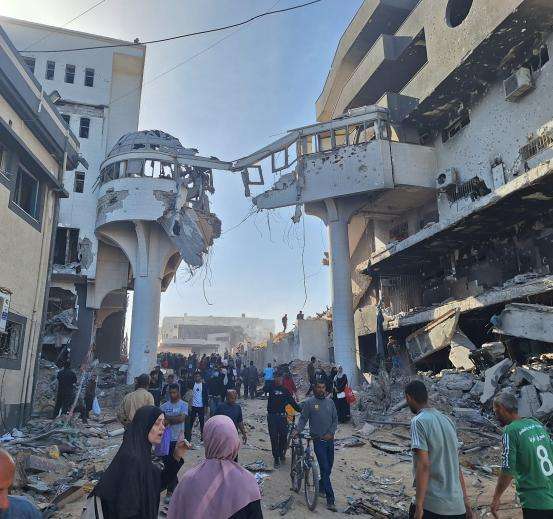
May 01 10:01 AM
How Israeli authorities block, delay, and restrict humanitarian aid and essential medical supplies.
Read More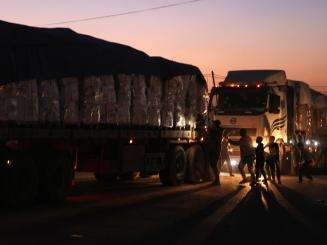
April 26 09:00 AM
The mental health impact of an unyielding war will leave health workers with scars for years to come.
Read More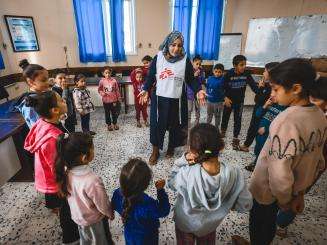
April 29 09:00 AM
Palestinians' physical and mental health continues to deteriorate due to ongoing war, preventable diseases, and a lack of access to medical care.
Read More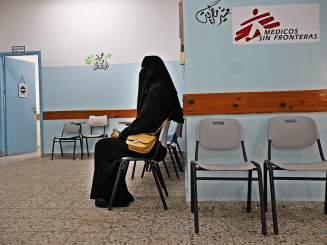
April 04 09:00 AM
Evidence points to deliberate and repeated attacks by Israeli forces on Nasser Hospital, once the largest hospital in southern Gaza.
Read More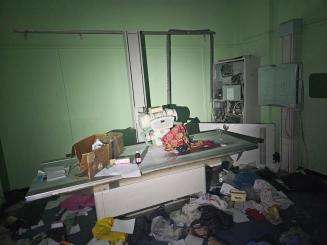
Some humanitarian crises make the headlines—others don’t. Unrestricted support from our donors allows us to mobilize quickly and efficiently to provide lifesaving medical care to the people who need it most, whether those needs are in the spotlight or not. And your donation is 100 percent tax-deductible.